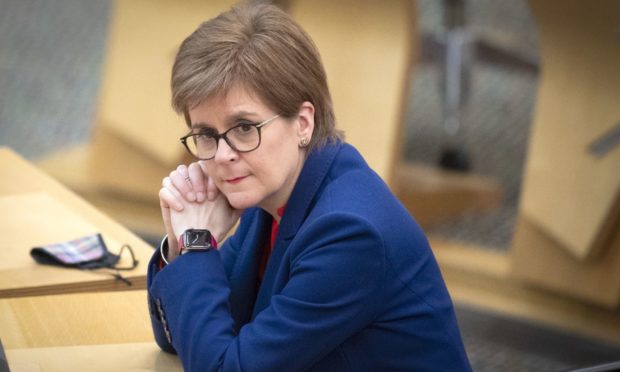First minister Nicola Sturgeon ‘misled’ Parliament when she said the Scottish Government couldn’t launch a money laundering probe against former US President Donald Trump, a court has heard.
Advocate Aidan O’Neill QC told judge Lord Sandison on Wednesday that Ms Sturgeon didn’t understand the law on a form of investigation called Unexplained Wealth Orders.
Mr O’Neill, who represents international human rights group Avaaz, is asking for permission from the court for a judicial review which he hopes would overturn the Scottish Government’s refusal to launch an unexplained wealth order against Mr Trump.
He was speaking during a hearing on Wednesday which concerns how Mr Trump obtained the funding for the Menie golf course in Aberdeenshire and the Turnberry resort in Ayrshire.
The Court of Session heard how the Holyrood administration was asked last year to investigate how the Trump Organisation managed to pay for golf course developments in Scotland.
The government was told it could use an ‘Unexplained Wealth Order’ to investigate Mr Trump’s finances.
But Ms Sturgeon told the Scottish Parliament that the government couldn’t launch such a probe and that the responsibility for the investigation lay with the Crown Office’s Civil Recovery Unit.
First Minister ‘didn’t understand’ the law
Mr O’Neill told the court that Ms Sturgeon said that the Civil Recovery Unit was politically independent from the Scottish Government.
The lawyer said the government’s position later changed. He said the then Justice Secretary Humza Yousaf later announced that the law allowed for the Scottish Government to launch an Unexplained Wealth Order investigation.
Mr O’Neill told the court that Mr Yousaf was correct – that the law allowed for the Scottish Ministers to launch such a probe.
He said that Ms Sturgeon failed to understand the law and that it was “worrying” that she didn’t have a proper understanding of the legislation.
Mr O’Neill said: “We know that the first minister initially said in July 2020 that any decision on whether to apply for an Unexplained Wealth Order is made on behalf of the Scottish Ministers by the Civil Recovery Unit which reports to the Lord Advocate.
“Now, there is all sorts which could be unpacked from that – the legislation states that it is the responsibility of the Scottish Ministers.
“But that was the position stated in July 2020 – now that has shifted markedly in November 2020 when we see that the First Minister said to Parliament the decision on whether to apply for the Unexplained Wealth Order was not for the ministers.
‘That was just wrong’
Mr O’Neill is acting for Avaaz – an international human rights group which is seeking to force the government to reverse its decision not to investigate the courses’ funding.
He went on to say: “It was instead for the Crown Office who operate independently from the Scottish Ministers.
“That’s just wrong and that was pointed out to them. In the answers, they say ‘yes that was just wrong’.
“We then get a different position when this time it’s the cabinet secretary for justice speaking – Humza Yousaf.
“He now concedes that the power to ask for an Unexplained Wealth Order does formally lie for the Scottish Ministers.
“But he says it is for the Civil Recovery Unit to independently undertake an investigatory role on behalf of the Scottish Ministers and this must not be subject to any form of political interference.
“Again it’s a shifting position.
“Strangely, the First Minister didn’t understand the law and misled Parliament on that point. That’s actually significant and worrying for if they have misunderstood the law once and they are in error there’s every likelihood- unless they get proper guidance from the court – that they could do so again.”
Bid for investigation into golf courses funding
The Scottish Green Party first called for an “unexplained wealth order” in February amid questions about how Trump had managed to finance the purchases of the courses at Turnberry in 2014 and at Menie In 2006.
The UK government introduced the orders in 2018 to help investigations into money laundering and other criminal financial activity.
Patrick Harvie, the Greens co-leader, has said Trump’s unusual pattern of spending and the ongoing civil and criminal cases in the US provided Scottish authorities with the grounds to investigate the businessman.
Mr Trump’s son Eric said the claims had “no basis in fact”.
He accused Mr Harvie of making “disgusting statements” that were “reckless, irresponsible and unbecoming for a member of the Scottish Parliament”.
EU law allows the ‘politically exposed’ to be investigated
On Wednesday, Mr O’Neill said that recent developments in the United States provided the Scottish Government with grounds to investigate Mr Trump.
He said that the Trump Organisation’s former Chief Financial Officer Allen Weisselberg had been charged in New York with alleged tax evasion and fraud.
Mr O’Neill said that Mr Weisselberg had involvement with Mr Trump’s business interests in Scotland.
The advocate also said that EU law on money laundering allowed ‘politically exposed’ people such as Mr Trump – and their close associates – to be investigated.
He added: “Documents lodged at Companies House reveal that there are significant assets owned by corporate entities in Scotland. It is clear that they linked to the Trump Organisation and various individuals are listed as having a significant interest.”
“One of those importantly is named as Allen Weisselberg.
“The court may or may not be aware but Allen Weisselberg has been the subject of an indictment in New York by the District Attorney in relation to the activities of the Trump Organisation in relation to alleged tax evasion and fraud.
“Allen Weisselberg was until a couple of days ago was listed in Companies House as a person with significant interest in these matters.
“There’s a changing and developing situation.
“That’s why we say that we have to look at the organisations and the individuals behind them. On the face of it we have UK registered companies owned by trusts for the benefit of former President Trump.”
Judge will consider his decision
Ruth Crawford QC, who is acting for the Scottish Government, said the law surrounding judicial reviews meant that matters had to be raised at the court within three months of the decision being passed.
She said that Mr O’Neill’s clients hadn’t acted within three months of the Scottish Government’s refusal and that the matter shouldn’t proceed.
Ms Crawford also said that Mr O’Neill had misunderstood the law surrounding unexplained wealth orders and that the Scottish Government had acted lawfully.
Urging Lord Sandison not to grant Mr O’Neill’s client permission to have a judicial review, Ms Crawford added: “Such an issue is not justiciable. It has no real prospect of success.”
Lord Sandison said he needed time to consider his decision.
He told the lawyers: “I won’t give a decision at this point in time. A decision will be issued very shortly – within the scope of the next few days. Thank you very much for your submissions.”


